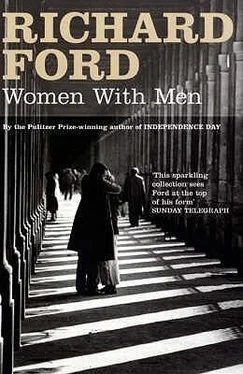Richard Ford - Women with Men
Здесь есть возможность читать онлайн «Richard Ford - Women with Men» весь текст электронной книги совершенно бесплатно (целиком полную версию без сокращений). В некоторых случаях можно слушать аудио, скачать через торрент в формате fb2 и присутствует краткое содержание. Год выпуска: 2006, Издательство: Bloomsbury Publishing PLC, Жанр: Современная проза, на английском языке. Описание произведения, (предисловие) а так же отзывы посетителей доступны на портале библиотеки ЛибКат.
- Название:Women with Men
- Автор:
- Издательство:Bloomsbury Publishing PLC
- Жанр:
- Год:2006
- ISBN:нет данных
- Рейтинг книги:3 / 5. Голосов: 1
-
Избранное:Добавить в избранное
- Отзывы:
-
Ваша оценка:
- 60
- 1
- 2
- 3
- 4
- 5
Women with Men: краткое содержание, описание и аннотация
Предлагаем к чтению аннотацию, описание, краткое содержание или предисловие (зависит от того, что написал сам автор книги «Women with Men»). Если вы не нашли необходимую информацию о книге — напишите в комментариях, мы постараемся отыскать её.
Women with Men — читать онлайн бесплатно полную книгу (весь текст) целиком
Ниже представлен текст книги, разбитый по страницам. Система сохранения места последней прочитанной страницы, позволяет с удобством читать онлайн бесплатно книгу «Women with Men», без необходимости каждый раз заново искать на чём Вы остановились. Поставьте закладку, и сможете в любой момент перейти на страницу, на которой закончили чтение.
Интервал:
Закладка:
AUSTIN HAD a fear in the days to come, almost a defeating fear that deprived him of sleep in his small, risqué apartment above the rue Bonaparte. It was a fear that Barbara would die soon, followed then by a feeling that she had died, which was succeeded by a despair of something important in his life having been lost, exterminated by his own doing but also by fate. What was that something? he wondered, awake in the middle of the night. It wasn't Barbara herself. Barbara was alive and on the earth, and able to be reunited with if he wanted to try and if she did. And it wasn't his innocence. That had been dispensed with long before. But he had lost something, and whatever it was, Barbara seemed associated. And he felt if he could specify it, possibly he could begin to pull things together, see more clearly, even speak to her again, and, in a sense, repatriate himself.
Not to know what that something was, though, meant that he was out of control, perhaps meant something worse about him. So that he began to think of his life, in those succeeding days, almost entirely in terms of what was wrong with him, of his problem, his failure — in particular his failure as a husband, but also in terms of his unhappiness, his predicament, his ruin, which he wanted to repair. He recognized again and even more plainly that his entire destination, everything he'd ever done or presumed or thought, had been directed toward Barbara, that everything good was there. And it was there he would need eventually to go.
Behind Joséphine, of course, was nothing — no fabric or mystery, no secrets, nothing he had curiosity for now. She had seemed to be a compelling woman; not a great object of sexuality, not a source of wit — but a force he'd been briefly moved by in expectation that he could move her nearer to him. He remembered kissing her in the car, her soft face and the great swelling moment of wondrous feeling, the great thrill. And her voice saying, “Non, non, non, non, non,” softly. That was what Bernard could never get over losing, the force that had driven him to hate her, even humiliate her.
For his part he admired her, and mostly for the way she'd dealt with him. Proportionately. Intelligently. She had felt a greater sense of responsibility than he had; a greater apprehension of life's importance, its weight and permanence. To him, it had all seemed less important, less permanent, and he could never even aspire to her sense of life — a European sense. As Barbara had said, he took himself for granted; though unlike what Joséphine had said, he knew himself quite well. In the end, Joséphine took herself for granted, too. They were, of course, very different and could never have been very happy together.
Though he wondered again in his dreamy moments after the fear of Barbara's dying had risen off and before he drifted to sleep, wondered what was ever possible between human beings. How could you regulate life, do little harm and still be attached to others? And in that context, he wondered if being fixed could be a misunderstanding, and, as Barbara had said when he'd seen her the last time and she had been so angry at him, if he had changed slightly, somehow altered the important linkages that guaranteed his happiness and become detached, unreachable. Could you become that? Was it something you controlled, or a matter of your character, or a change to which you were only a victim? He wasn't sure. He wasn't sure about that at all. It was a subject he knew he would have to sleep on many, many nights.
Jealous
IN THE LAST DAYS that I lived with my father in his house below the Teton River, he read to me. Seated at the kitchen table after work or on the cold mornings when I dressed in front of him by the stove, he read out loud to me from the Havre or the Conrad newspapers or from magazines —Life s or Geographic s— or from old schoolbooks that had been bound in twine and abandoned in the back rooms by some previous, unknown family who'd left behind the things they couldn't take.
We were alone there. These were the months following my mother's first departure, and we had lived out from Dutton since my school year began. My mother had left the summer before, at the end of a long period of troubles between them, and almost immediately after that my father quit his job in Great Falls and moved us up to Dutton, where he took a new job, working on farm machinery. He had always liked a drink, and so had my mother, and they had had friends who drank. But in Dutton he quit drinking altogether, quit having any whiskey around the house. He worked long days in town, and trained his bird dogs in the evening, and I went to high school. And that was what life was like.
It may have been, of course, that he was expecting some important event to take place, some piece of new news to suddenly reach him. Possibly he was waiting, as the saying goes, for lightning to strike, and what he wanted was to be in the right place and in the right frame of mind to make a decision when it happened. And it may have been that he read to me as a way of saying, “We don't know all there is to know. There's more order in life than seems to be. We have to pay attention.” That is all another way of saying that he was at a loss. Though my father had never been a man who stood by and watched things get the better of him. He was a man who acted, a man who cared to do the right thing. And I know that even on the day these events took place he was aware that a moment to act may have come. None of it is anything I blame him for.
ON THE DAY before Thanksgiving, it rained an hour before daylight, when I was waking up, then rained through the afternoon, when the temperature fell and snow began and the front of the mountains disappeared into a bluish fog, so that it was no longer possible to see the grain elevators in Dutton, ten miles away.
My father and I were waiting for my mother's sister to arrive to take me to the train in Shelby. I was going to Seattle to visit my mother, and my aunt was going with me. I was seventeen years old then. It was 1975, and I had never ridden on a train before.
My father had come home early, taken a bath, dressed in a clean shirt and slacks, then sat down at the kitchen table with a stack of Newsweek s from the town library. I was already dressed. My bag was packed, and I was standing at the kitchen window watching for my aunt's car.
“Are you familiar with Patrice Lumumba?” my father said after reading to himself for a while. He was a tall, bony-chested man with thick black hair and thick hands and arms, and the table seemed small in front of him.
“Was she a singer?” I said.
“He,” my father said, looking out the lower lenses of his glasses as if he were trying to read small print. “He was the African Negro Eisenhower wanted to poison in 1960. Only Ike missed his big chance. His other enemies blew him up first. We all thought it was mysterious back then, of course, but I guess it wasn't that mysterious.” He took his glasses off and rubbed them on his shirt cuff. One of the setters barked out in the pen. I watched it come to the fence by the corner of the granary, sniff through the wires, then walk back in the misting snow to its house, where its sister was in the doorway. “The Republicans always have secrets,” my father said, holding his glasses up and looking through them. “A great deal goes on before you wake up to life.”
“I guess so,” I said.
“But you can't change it,” he said, “so don't let it eat at you.”
Through the window I saw my aunt's big pink Cadillac appear suddenly up on the horizon road, rushing ahead of its snow cloud, still a mile out.
“What're you going to tell your mother about living out here out-of-sight-of-land all this fall?” my father said. “That there's an atmosphere of mystery on the open prairie?” He looked up and smiled at me. “That I've been neglecting your education?”
Читать дальшеИнтервал:
Закладка:
Похожие книги на «Women with Men»
Представляем Вашему вниманию похожие книги на «Women with Men» списком для выбора. Мы отобрали схожую по названию и смыслу литературу в надежде предоставить читателям больше вариантов отыскать новые, интересные, ещё непрочитанные произведения.
Обсуждение, отзывы о книге «Women with Men» и просто собственные мнения читателей. Оставьте ваши комментарии, напишите, что Вы думаете о произведении, его смысле или главных героях. Укажите что конкретно понравилось, а что нет, и почему Вы так считаете.












